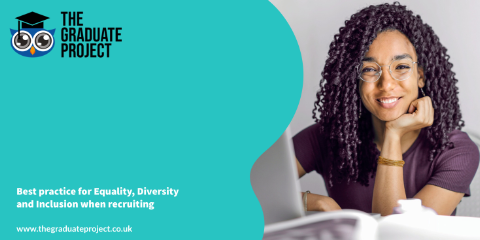Search Vacancies
Blog
Best practice for Equality, Diversity and Inclusion when recruiting
- January 26, 2021

The goal of every recruiter is to select and hire the best employees possible. However, recruitment decisions are often distorted by unconscious bias. These biases can be difficult to uncover and can lead to imbalances in the hiring process, resulting in uniformity in the workplace instead of diversity.
Diversity is important because not only does it enhance employee experience, but it is also beneficial to the business’ bottom line. A diverse workforce strengthens a company’s reputation as being a great place to work and evidence has shown that businesses with a diverse workforce are more likely to financially outperform their industry’s national average.
Here are 5 steps you can follow to reduce hiring bias:
- Write inclusive job descriptions
Ask yourself – have you defined what the job role is and what skills are required? Could someone outside of your organisation easily understand what is expected?
All organisations inadvertently develop their own language. While it might make sense to everyone already working in the industry, if you want to attract people are different to the status quo, they need to understand what is expected from the beginning.
Make sure the criteria you set are clear and reflect the skills and competencies needed to do the job.
- Inclusively design the application process
In your recruitment system, check that the messages and instructions displayed throughout the application form-filling process are friendly and inclusive. Design the application process in a simple way that does not confuse or frustrate applicants.
Your organisation’s commitment to equal opportunities is something that really matters to diverse applicants – does your equality and diversity policy stand out the way it should?
- Widen your search to include diverse groups
When considering your job advertisement, consider the following. Where are you placing the ad? And are you being mindful of different groups who may want to apply?
Nowadays, you can place your job ads on large recruitment websites, LinkedIn, or in a broadsheet newspaper, but you can also be imaginative. You could potentially use promoted social media posts or through various networking groups.
- Make shortlisting fair
Assessing CVs without including any personal information is effective at removing any bias against diverse applicants. This involves getting a person not involved in the shortlisting process to make sure the panel does not see names, schools, locations, and date of birth, ensuring assessors’ decisions only account for the skills and experience of the candidate – the things that matter.
- Prepare for an inclusive interview
The more preparation you do for the interview, the less the danger of making a biased decision and the greater the likelihood of making an evidence-based decision.
Your planning will give you the time you need to concentrate on the things that really matter during the interview: setting the right tone, finding the best means for candidates to demonstrate their capabilities, asking questions, listening, writing notes. Now that many interviews are held online, you also need to include more time in interviews for screen freezing and any technical issues that might come up.
We have an array of positions on our website, so please do visit https://www.thegraduateproject.co.uk/jobs/search
By Anirudh Nair
